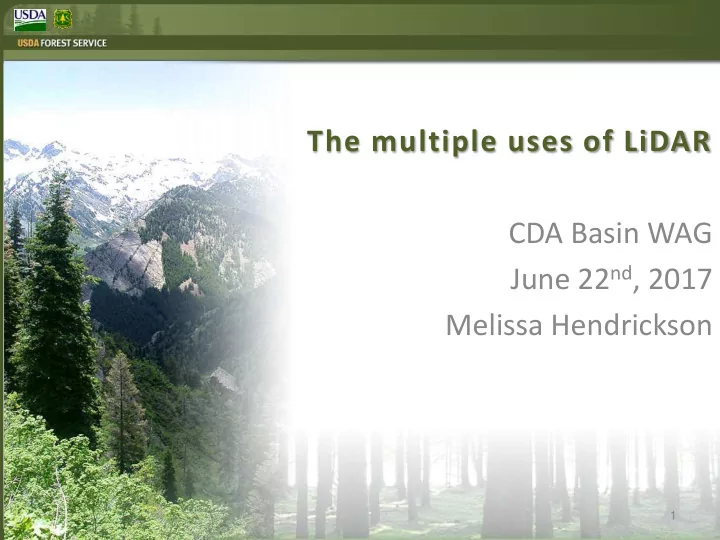

The multiple uses of LiDAR CDA Basin WAG June 22 nd , 2017 Melissa Hendrickson 1
What is LiDAR? 2
LiDAR Returns Distance = (Speed of Light x Time of Flight)/2 3
Correcting our Existing GIS Databases 4
Mining and Geology 5
Land Form Stability 6
Confirming old Ground based units 7
Terracing 8
Intensity 9
Canopy Density 10
Canopy Height 11
Curvature 12
Curvature 13
Verify Previous Work 14
Prioritize Watershed surveys 15
Wildlife 16
Recreation 17
Setting up of logging units 18
19
Stand information 20
Unit Layout and road design using Slope Layer 21
LIDAR Forestry Metrics AGB Above-ground biomass BA Basal area Crown competition factor (where CCF of 100 means no competition for light, everything over CCF 100 indicates competition); can be used sort of like canopy cover MCUFT merchantable volume quadratic mean diameter - useful metric but not directly comparable to stand exam data (run QMD a regression first) SDI stand density index TCUFT total volume - *this variable seems to be the most comparable to stand exam data* TOPHT average canopy height TPA trees per acre 22
Summarize LIDAR statistics to polygons 23
Extrapolate stand exam data LIDAR DATA STAND EXAM DATA INV_ SE_ SE_ SE_ SE_ SE_ SE_ SE_ SETTING_ID AGB BA CCF MCUFT QMD SDI TCUFT TOPHT TPA YEAR AGB SE_ BA CCF MCUFT QMD SE_ SDI TCUFT TOPHT TPA 1040306080003 9 19 27 83 0.6 83 218 26 3740 #N/A #N/A #N/A #N/A #N/A #N/A #N/A #N/A #N/A #N/A 1040306080010 119 72 75 1949 7.1 174 2244 69 919 #N/A #N/A #N/A #N/A #N/A #N/A #N/A #N/A #N/A #N/A 1040307010001 11 15 18 156 3.1 53 266 39 1992 #N/A #N/A #N/A #N/A #N/A #N/A #N/A #N/A #N/A #N/A 1040307010002 14 18 23 201 3.1 66 324 41 2447 #N/A #N/A #N/A #N/A #N/A #N/A #N/A #N/A #N/A #N/A 1040319010001 222 166 183 4543 8.2 331 5308 89 745 2014 137 158 170 5383 9.3 298 6009 102 332 1040319010002 195 156 179 4185 7.0 329 4890 85 789 #N/A #N/A #N/A #N/A #N/A #N/A #N/A #N/A #N/A #N/A 1040319010003 140 141 165 3107 6.7 305 3763 75 856 2014 118 134 147 4076 6.7 287 4574 93 545 24 1040319010004 127 120 136 2777 6.7 263 3338 74 800 2015 82 99 127 1995 5.9 225 2781 85 526 1040319010005 100 102 118 2163 6.1 224 2637 67 961 #N/A #N/A #N/A #N/A #N/A #N/A #N/A #N/A #N/A #N/A
Quantifying spatial variation 25
Moose Drool 26
Moose Drool 27
Moose Drool 28
Recommend
More recommend